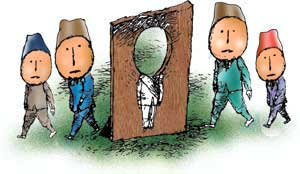 It looks like the Maoist tactic of low-intensity offensives had the desired effect of getting the government negotiator to heli-hop to Nepalganj to fix the date and venue for the third round of talks for Sunday. The government's strategy of deliberate drift wasn't taking this anywhere.
It looks like the Maoist tactic of low-intensity offensives had the desired effect of getting the government negotiator to heli-hop to Nepalganj to fix the date and venue for the third round of talks for Sunday. The government's strategy of deliberate drift wasn't taking this anywhere. Meanwhile, the political parties are still sulking, stubbornly refusing to take part in any talks, while warning ominously of a "decisive" seventh phase of agitation that will bring "the country to its knees" with the veiled threat that demos could "turn violent". Girijababu is in Mahottari this week thinking aloud about his hunch that the king and the Maoists have forged an "unholy alliance" against democracy. This brought a sharp rebuke from the usually mild-mannered government spokesman and member of the government peace team, Kamal Thapa, who warned party leaders to watch their language.
It is Nepal's never-ending tragedy that even in this hour of dire crisis, we are all trying to outsmart each other. Actually, it depends on how you define smart. Showing smartness for short-term gain is almost always stupid in the long-term. We can list numerous examples of governments, leaders and political parties in our region discovering this to be true in hindsight, and too late. Backing a militant outfit for short-term advantage for the national interest always turns out to be a disaster. "We don't care if he is a son-of-a-bitch as long as he is our son-of-a-bitch" is a statement that summarises the idiocy of trying to be too smart by half, as super and regional powers have found out to their grief. You reap what you sow, and by harvest time it is a monster.
Stop-gap damage control with a narrow political time horizon is not what is going to get us out of this mess. Both sides in the peace talks this weekend, and the political parties in the sidelines, need to look at the bottomline: who will benefit if the killings start again? Not the Nepali people. But what the Nepali people want, and what they think, doesn't seem to matter anymore to people obsessed with trying to score political points. And we in the media must not unwittingly allow ourselves to be manipulated by these spinmasters.
Some 7,000 innocent people have been killed in the past seven years. How many more have to die? How many thousands will be killed if the talk don't go anywhere?
The government says it is doing its "homework" on a political agenda for the talks. That homework was long overdue. This country's long-term security will only be guaranteed by a just peace that tackles underlying causes of conflict. We need inclusion, representation and equal opportunities not just as concessions to the Maoists in these talks, but because this country urgently needs those reforms.
Our advice to the negotiators and media-obsessed facilitators is this: spare us your blow-by-blow accounts.
Just call us when you have agreed on how to get there.


